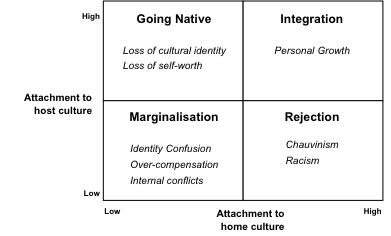We’ve discussed in the Social Structures section how society is a concept transmitted by memes, and in memetic organisations how corporate culture is too. But since our parents infect us with their cultural view from the time that we learn to recognise language, and the process continues throughout our education until the time we enter the world of work, it should come as no surprise that the societal culture overrides the corporate culture in almost every case. If we ignore this, as people from strongly universalist societies (like Norway and the United States) are prone to do, the consequences on their ability to manage are serious.
As a general rule, when working in someone else’s culture try to follow their rules and ways of doing things. But that's not always easy.

In extreme cases, meme clashes can result in culture shock, which can manifest in a variety of ways as shown in the diagram above. If you cannot accept the culture you are working in, you are leaving yourself open to a range of dysfunctional behaviours that depend (in my view) on the extent of the meme clash and the porosity of the individual - the reader is encouraged to consult Ward, Bochner and Furnham’sThe Psychology of Culture Shock before sending individuals overseas to work.
Communicating across cultural boundaries can also be extremely difficult, as we saw in the leadership section.